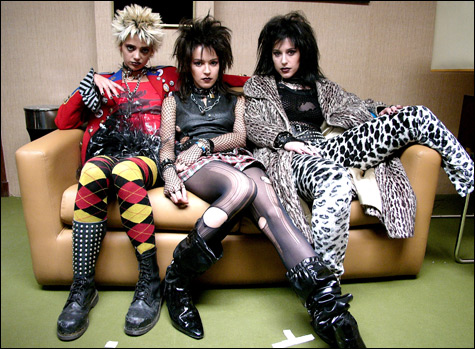
EL CALENTITO: Vinyl nun’s habits and bared breasts? Count us in. |
Has gay cinema become a mere ghetto nowadays, of interest to its sexual demographic and no one else? So it would seem in the light of the past decade or so of gay-themed indies, the default nature of which seems to be a blind desire to reach a perfect middle state of bland unadventurousness, and to lure middle-class het audiences with sappy tales of awkward romance, campy frolic, and simplistic tolerance sermons. Used to be, in the early ’90s and amid the acidic launch of what was soon thereafter called the New Queer Cinema, that hacksaw-edged movies on the order of Greg Araki’s The Living End, Tom Kalin’s Swoon, Gus Van Sant’s My Own Private Idaho, Todd Haynes’s Poison, Christopher Munch’s The Hours and Times, and Derek Jarman’s Edward II were acts of radical culture designed to express, to everyone regardless of orientation, not how truly similar their gay characters were to straights but how outrageously, irksomely different. Most important, the films themselves adopted experimental means, and in form as well as thrust they endeavored to be nobody’s grandmother’s nice idea of a harmless, assimilated homosexual demographic.
Today, and for whatever it’s worth from a hetero critic whose own fashionably thorny rebel days are officially behind him, the bite seems to have gone out of the blow job. Too often, the perspectives and dynamics offered up are nothing you couldn’t find in a made-for-WE movie or a Nancy Meyers ripoff. At this year’s Boston Gay & Lesbian Film/Video Festival, the crop continues to explore what are apparently seen as the only exploitable assets of gay culture in general: chick-lit-style romance, identity transitionism, and burlesque performance. If the first of these manifests mostly as a quest for mainstream sympathy, the next two stupefy with their ubiquitous self-aggrandizement. Had a Martian, or a Wisconsin middle-classer, endured a sizable hunk of contemporary gay film, you could hardly blame him or her or it for coming away with the sense that gay culture is largely an expression of gargantuan narcissism.

So though polished features like Pratibha Parmar’s NINA’S HEAVENLY DELIGHTS (2006; May 20 at 7:45 pm) and Eytan Fox’s THE BUBBLE (2006; May 17 at 7:45 pm) cast their gay characters’ uneasy socialization as metaphors, more or less, for other varieties of cultural crossover, their narrative vocabulary plays to the cheap seats. Cursed with a title that should send sugar shivers up your spine, Parmar’s film is set in Glasgow, and amid the city’s semi-Scot-acclimated Indian population, not a diasporic mix you see often in movies. On top of that, the heroine, Nina (Shelley Conn), is a femme dyke who returns home from London (after escaping family disapproval) when her beloved curry-restaurant-owning father dies. Good thing she’s ridiculously gorgeous: that stands her in good stead when she persuades the straight, all-Scottish daughter of her father’s partner (Laura Fraser) to keep the eatery open at least until they can together win the city’s Best of the West curry contest. Which lands them, chastely as far as we see, in each other’s arms. In case we needed to be told that beautiful, high-cheekbone lesbian love is a-okay, an array of flaming-queen buddies and relatives pointlessly fill in the margins while Nina’s old-guard mother growls and glares. Parmar pours on the exposition and political correctness like cemented gravy.
Fox’s film is only marginally more convincing, and that’s thanks largely to its milieu: Tel Aviv, where a semi-closeted gay Israeli (Ohad Knoller) serving as an Army guard at a checkpoint makes gaydar eye contact with a Palestinian (Yousef Sweid). They hook up, of course, sex and cuddling solving the pesky Middle East crisis for at least a few lucky queers. The first scene trumps the film’s later, and clumsy, portraiture of urbane gay community: at the checkpoint, a guard’s ramrod handling of a crowd sparks off a pregnant woman’s labor and, soon enough, her miscarriage, right there in the street. Such dramatic fireworks do not continue to fly; Fox’s characters are more interested in their navels and Fox is more interested in the moody vagaries of whimsical, inexpressive romance. Think of it as Sex in the City in Tel Aviv.
The documentaries run the gauntlet. At the far end of the self-obsession spectrum is Elizabeth Stark & Kami Chisholm’s FTF: FEMALE TO FEMME (2006; May 11 at 6:30 pm), an artless examination of some lesbians’ decision to lipstick it up instead of butch it down. Hardly an earthshaking social paradigm to most of us, if obviously so to the egomaniacs interviewed, every one of them (save an academic) a performer of one, usually campy, type or another. (Thank goodness for actress/screenwriter Guinevere Turner, who’s not only lovely but modestly articulate; she sticks out like a swollen thumb.) It’s a movie not about lesbians but about lesbian performance-art extroverts.